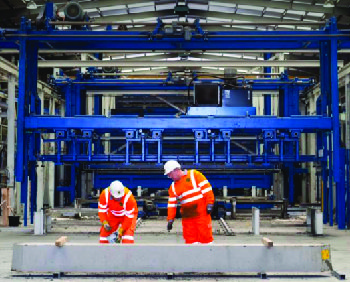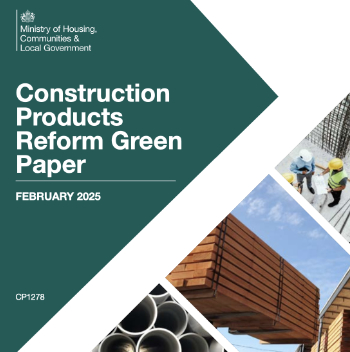Views sought to develop UK Net Zero Carbon Buildings Standard
Contents |
[edit] The Net Zero Standard
The UK Net Zero Carbon Buildings Standard (“The Standard”) is calling for views from across the industry as part of their Technical Update & Consultation.
The technical update describes the technical fundamentals behind the Standard, sharing information about the metrics that buildings will be assessed against to demonstrate that they are aligned with what is required for the UK built environment to achieve Net Zero Carbon.
The focus of the Technical Update is on operational energy and embodied carbon performance levels for new buildings. These performance levels provide the context of technical feasibility for each of the sectors covered by the Standard. The update also outlines the approach being taken to determine relevant budgets for carbon and energy, that inform the Net Zero Carbon limits that will follow in later stages of work.
[edit] Consultation themes
There are three main themes that the Standard team are seeking views on, which are covered in the consultation documents. These are fundamentals and metrics; the achievability of bottom-up levels of performance; and top-down available energy and carbon budgets. More technical information on these can be found in the Notes to Editors.
Technical Steering Group member, Julie Godefroy from CIBSE said: “A huge thank you to all who have contributed to this Technical Update and Consultation. We want to hear from as many stakeholders as possible. Please do engage with our consultation so we refine our approach, identify areas of consensus and priorities for further work, and set a robust but ambitious Standard".
[edit] Call for industry-wide responses
The aim of this consultation is to gain feedback on both the new build performance levels derived from this year's analysis, and the decisions made to-date around fundamentals, metrics, and approach to limits.
For this reason, we are seeking the views of as wide an audience as possible, from designers to carbon assessors, and developers to contractors.
[edit] Aims of the Consultation
To achieve industry-wide approval, the Standard team is seeking input from professionals across the built environment throughout the development phase.
Visit www.nzcbuildings.co.uk/ to read our Technical Update, which contains talking points and questions to answer in our accompanying survey.
The window is now open to respond until 11.59pm on Thursday 31 August. There will be a consultation webinar at 12pm on Monday 10 July, where emerging industry queries will be answered, and you can register here.
The Standard team is also taking this opportunity to re-open the call for evidence for embodied carbon data, to gather more data for the sectors where this was not possible from the first round of data-gathering. More details are included within the consultation pack.
[edit] Comment from the chair
Speaking about the Technical Update and Consultation, Chair of the Standard’s Governance Board, David Partridge said: “We urge everyone within the built environment sector to get involved in the consultation process which we are launching today. We have already engaged with many stakeholders across the whole sector, and we want to ensure that we hear your views on the progress that the team has made, to ensure that the Standard will be adopted by everyone who has an interest in this crucial topic.”
[edit] Main themes of the consultation
There are three main themes that run through the consultation, most importantly with views sought on these. They are:
Fundamentals and metrics: The consultation documents outlines the main metrics that will be used by the Standard and sets out the context for how these will be used.
Achievability of bottom-up levels of performance for new buildings: Operational energy and embodied carbon performance levels have been established, which provide technical evidence on what can be achieved by the individual sectors, based on benchmarking, case studies and modelling. They are not limits or targets but will be used to inform the Net Zero Carbon (NZC) limits and targets in the next stage of work. The focus of the consultation is a review of the new build operational energy and embodied carbon performance levels.
Top-down available energy and carbon budgets: The consultation provides an update on the method by which carbon and energy budgets are being calculated and downscaled.
[edit] Further information
This initiative will lead to the creation of the UK's first Net Zero Carbon Buildings Standard. Leading industry organisations from across the real estate built environment have joined forces to champion this initiative.
Whilst significant progress has been made in defining what ‘net zero’ means for buildings in the UK, a process of market analysis showed a clear demand for a single, agreed methodology.
The UK Net Zero Carbon Buildings Standard will enable industry to robustly prove their built assets are net zero carbon and in line with our nation’s climate targets.
In September 2022, the UK Net Zero Carbon Buildings Standard set up a Governance Board, made up of a diverse membership of specialists helping to drive forward this initiative at pace. The Board has been joined by representatives from the Property Industry Alliance, the Royal Incorporation of Architects in Scotland, and the Institution of Civil Engineers.
The Standard received data on 3,800 buildings across the UK in their Call for Evidence in December 2022/January 2023, and currently have more than 350 people across the industry contributing directly in a voluntary capacity to the creation of the Standard.
For further information about the UK NZCBS, please visit https://www.nzcbuildings.co.uk/
This article was issued via Press Release from [email protected] as "Views sought to develop UK Net Zero Carbon Buildings Standard " dated Jne 15, 2023.
[edit] Related articles on Designing Buildings
- Achieving net zero in social housing.
- Aligning net zero with the levelling-up agenda.
- A zero-carbon UK by 2050?
- Construction skills crisis threatens UK net zero goals.
- CO2nstruct Zero programme grows to over 70 businesses.
- Heat pumps and heat waves: How overheating complicates ending gas in the UK.
- Infrastructure carbon reduction misses net-zero target.
- Low or zero carbon technologies.
- Making Mission Possible: report on achieving a zero-carbon economy by 2030.
- Nearly zero-energy building.
- Net Zero All Party Parliamentary Group NZ APPG.
- Net zero by 2050.
- Net zero (whole life) carbon.
- Net zero carbon building.
- Net zero carbon emissions.
- Net zero strategy: build back greener.
- Planning the infrastructure transition to net-zero.
- Scotland publishes plans to reach net zero targets with Heat in Buildings Strategy.
- Skilled workforce unable to meet net zero ambitions.
- Smoothing the path to net zero.
- Thermal imaging of the building fabric in the net zero world.
- Transform to Net Zero.
- UK net zero carbon buildings standard.
Featured articles and news
Places of Worship in Britain and Ireland, 1929-1990. Book review.
The emancipation of women in art.
CIOB Construction Manager of the Year 2025
Just one of the winners at the CIOB Awards 2025.
Call for independent National Grenfell oversight mechanism
MHCLG share findings of Building Safety Inquiry in letter to Secretary of State and Minister for Building Safety.
The Architectural Technology Awards
AT Awards now open for this the sixth decade of CIAT.
50th Golden anniversary ECA Edmundson awards
Deadline for submissions Friday 30 May 2025.
The benefits of precast, off-site foundation systems
Top ten benefits of this notable innovation.
Encouraging individuals to take action saving water at home, work, and in their communities.
Takes a community to support mental health and wellbeing
The why of becoming a Mental Health Instructor explained.
Mental health awareness week 13-18 May
The theme is communities, they can provide a sense of belonging, safety, support in hard times, and a sense purpose.
Mental health support on the rise but workers still struggling
CIOB Understanding Mental Health in the Built Environment 2025 shows.
Design and construction material libraries
Material, sample, product or detail libraries a key component of any architectural design practice.
Construction Products Reform Green Paper and Consultation
Still time to respond as consultation closes on 21 May 2025.
Resilient façade systems for smog reduction in Shanghai
A technical approach using computer simulation and analysis of solar radiation, wind patterns, and ventilation.
Digital technology, transformation and cybersecurity
Supporting SMEs through Digitalisation in Construction.
Villa Wolf in Gubin, history and reconstruction. Book review.
Construction contract awards down one billion pounds
Decline over the past two months compared to the same period last year, follows the positive start to the year.
Editor's broadbrush view on forms of electrical heating in context.

























